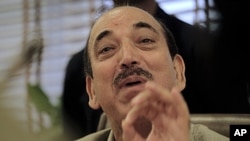HIV and gay-rights activists are sharply criticizing India's health minister for his remarks labeling homosexuality as a disease. The comments reflect entrenched attitudes in a country that only lifted a criminal ban on homosexuality two years ago.
Health and Family Welfare Minister Ghulam Nabi Azad's controversial remarks came during a conference on fighting HIV and AIDS held Monday night in the Indian capital.
"There is unfortunately a disease in the world and in this country," he said, where men are having sex with other men. The government minister says such acts are "completely unnatural" and shouldn’t happen, but they do.
Azad contends that health workers find it more difficult to reach out to homosexual men than to other high-risk communities, such as female sex workers.
AIDS activists have criticized the comments in terms ranging from "uncalled for" to "absurd and dangerous." They say the impropriety of the remarks coming from India's top public health official was compounded by the fact that he made them at a conference on fighting the spread of HIV and AIDS.
Roy Wadia is executive director of the Mumbai-based Heroes Project, funded by the Bill and Melinda Gates Foundation. He says such public statements are not helpful in his efforts to educate the public on HIV/AIDS.
"Clearly he is in a minority when it comes to these points of view in his own government," said Wadia. "We certainly expect he will be taken to task for this, but the most important thing is for him to really be educated."
About 2.5 million people are infected with HIV in India. Wadia says Azad's use of the terms "unnatural" and "disease" in relation to homosexuality make it more difficult to provide scientific information to the people who need it most.
"Stigma and discrimination attached to HIV as a whole make it very hard for us to face the HIV challenge - not only in India, but even in the West, you'll find that stigma is at the heart of the HIV challenge," Wadia added.
Gay pride parades like this one that took place last year in the streets of New Delhi have become a more frequent occurrence as public attitudes move in the direction of acceptance. But change comes slowly; it was only two years ago that India's supreme court struck down a criminal ban on homosexuality lingering from the British colonial era.
Indian Minister Sees Homosexuality as 'Disease'
- By Kurt Achin










